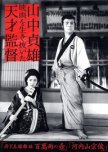
Sazen Tange and the Pot Worth a Million Ryo
5 people found this review helpful
Treasure map to a hidden gem of a film
I braced myself when I started Tange Sazen and the Pot Worth a Million Ryo. Having watched numerous films from the 1920’s and 30’s, I’m used to darker themes and sadness. To my relief and surprise, this 1935 film was a delightful, lighthearted romp with no undo suffering in sight.A miserly daimyo lord discovers that the old, dirty, monkey pot he’d gifted his brother turns out to hold a map for a million ryo hidden treasure. The brother, Genzaburo, is dominated by his beautiful wife and offended at the cheap gift. When the daimyo’s retainer generously offers to take the "worthless" pot off his hands, Genzaburo refuses. He’s excited when he finds out about the treasure map, but also thwarted when his wife tells him she sold it for a pittance. The missing pot actually gifts him with something better than money. In order to search for the pot, he’s able to leave the house unattended!
“Edo is huge. It might take 10 or even 20 years. It’s like going out for revenge.”
The pot ends up in the hands of an orphan who uses it as a goldfish bowl. Both pot and child are taken in by the one-eyed, one-armed ronin, Sazen Tange. Sazen is also henpecked, not by a wife but by the proprietress of the shop he guards. There are gifts for sale and men can come in to eat and drink and shoot arrows at targets, much like at an arcade. The fun begins as multiple people search for the pot in earnest and Genzaburo delays finding it so that he can have some fun.
I don’t always connect with the humor in nearly 100-year-old films, but I laughed out loud a couple of times with this one. Even when they bickered and verbally refused to do the right thing, the characters always ended up being generous, protective, and kind. There were a few, quick samurai fights and sparring, but nothing to ruin the gentle mood.
This Tange Sazen film was a beautiful hidden gem, highlighting some of the best of humanity in a humorous way. I wish more of director Yamanaka Sadao’s films had survived. I look forward to trying his other two extant films.
8 July 2024
Was this review helpful to you?

"Only the cloud knows the feather"
Spies, assassins, poison, sword fights, and a struggle for the leadership of one of the last sects not under the thumb of the evil Wufeng sect, My Journey to You attempted to cover a lot of ground. Populated with beautiful people and costumes, this drama was sometimes more stunning to look at than compelling.What drew me to this drama was the promise of not one, but at least two female “assassins”. This felt like a bad translation, as they were more spies than killers. Yun Wei Shan had real possibilities for a dark and intriguing character. Once the Gong male characters were introduced, it often felt like the Wufeng spies had little to do other than talking in whispered tones. When a double tragedy left the underachiever, Gong Zi Yu, as the only choice for Sword Wielder, I had to agree with the snide Gong Shang Jue. Zi Yu was pitifully unprepared for such a task. Of course, it was difficult to side with Shang Jue and his “brother” Yuan Zhi, as they could be insufferably contemptuous. Much of the drama focused on Zi Yu’s trials in the Three Realms of the Back Hill with some assistance from Yun. Shang Jue had his own undercover bridal spy to deal with as well.
At the beginning I was completely engaged with this drama. Then it began to rinse, lather, repeat for me one too many times. Zi Yu and Shang Jue kept being hauled before the elders where they could accuse the other of causing problems. At this point I felt like neither one deserved to be the Sword Wielder. The Back Hill provided some interesting characters and trials when the two Gongs weren’t arguing over who was prettiest. There were multiple attempts at humor, usually involving the overly dramatic and over acted role of Gong Zi Shang and her crush on Zi Yu’s bodyguard, Jin Fan. Which brings up the point, this was the martial world and only the “bad” girls knew martial arts. The Gong women all seemed to be rather defenseless. To quote Eowyn from LOTR: TT, “Those without swords can still die upon them.” The oldest surviving Chinese wuxia starred a woman! I was disappointed by the lack of Gong women wielding swords.
The beginning was strong and I enjoyed some of the middle until it became bogged down in recrimination after recrimination. The last part with the fights that had real consequences was more engaging. Then the big “twist” was almost a movie length of exposition. “I suppose you all wondered why I gathered you here today…” The acting varied from adequate to excellent. This drama should help Ryan Cheng graduate from web dramas for good. I also quite enjoyed Wen Zheng Rong’s performance as Lady Wu Ji. She was able to go from calculating to maternal in the blink of an eye.
Overall, I found this to be an entertaining and binge-worthy, if flawed, drama. Had it not been for my least favorite ending-the open end, I would have bumped it up to at least an 8. Maybe there will be a S2, maybe there won’t. If they develop a compelling S2 that coincides with this story well, I’ll revisit my rating. Even with the disappointing ending, this was a journey worth making.
1 July 2024
Was this review helpful to you?
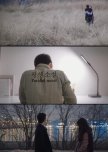
Creative writing with a twist!
I was looking for female directors and came across this tantalizing short film. At the age of 21, Go Min Si wrote, directed, and starred in Parallel Novel.This film reminded me of the SpongeBob episode when the pencil with magical powers came into his possession. I wish this film had been longer to develop the elements we were teased with in this fleeting story. In 3 minutes Go Min Si created two worlds, filmed beautifully. With no spoken dialogue the emotions were played out perfectly with body language and aided by the tense musical background. There was more suspense in 90 seconds than some movies accomplish in 2 hours.
What I loved the most about this concise and well paced film was that the female character stood up for herself against a terrible male writer who had subjected her to some of the worst tropes aimed at women. I only wished she had taught him a better lesson!
Go Min Si showed great promise with this short film. I'm disappointed that 8 years later she hasn't had any more screenwriting or directing credits. I'd really like to see what she could do with a bigger budget and full length format. If you have 3 minutes to spare, I could easily recommend Parallel Novel.
19 June 2024
Was this review helpful to you?

"Life is so hard"
The Old Town Girls was a film that wasn’t sure what it wanted to be or maybe it wasn’t what I wanted it to be. The film was inspired by a true story, though I don’t know which of the unsavory real events made it to the screen. Three girls with absentee parents, living in a dying town, had their lives turned upside-down when Shui Qing’s mother came back into her life after seventeen years. Darkness lurked beneath the shining yellow façade Qu Ting hid behind which would affect everyone adversely.Shu Qing’s dad spends much of his time working at the local factory. Her stepmom resents her presence which leaves Shu Qing alone much of the time. One day Qu Ting returns to Shu Qing’s life in a flash, driving a yellow car, wearing yellow clothes, and bright red lipstick in contrast to the drab world her daughter inhabits. Shu Qing is so desperate for a parent’s love and attention that she quickly forges a bond between them, willing to do anything her mother asks. Shu Qing’s friend Jin Xi is well to do, but lives alone most of the time while her parents travel for work. The third friend, Ma YueYue, has lived with a wealthy couple for years while her father worked elsewhere. When he returns, he dominates her life and physically abuses her. Qu Ting brings a great deal of energy and controversy to the friends as well as death when her past catches up with her.
Director Shen Wu started the film at the end and then went back a few days to show the actions leading up to the tragic consequences. I wish she hadn’t as it took much of the suspense out of the ripped from the headlines events. The criminal part of the story felt heavy-handed and clumsy. The strength of the story centered around the three girls desperate for attention and love. I would like to have seen their backgrounds more fully developed, including the mother’s. The economy had a direct effect on the parental absences which created insecurities in the teenagers. All three girls felt trapped in their unhappy homes. The flamboyant mother’s arrival shook them up and took a toll on the friendships. This could have been an engaging coming of age and friendship film, but it disintegrated into a tragic crime committed by a desperate daughter compelled to save her mother and keep her in her life. The mother’s life was the sum total of her repeated mistakes and bad decisions which came to define her daughter’s life as well. The Girls of Old Town was an entertaining watch although the ending felt out of touch with the rest of the film. If you are in the mood for a dark, melancholy film designed to make you feel uneasy, this might be the ticket.
18 June 2024
Was this review helpful to you?

The Fascinating Dream in the Grassland
5 people found this review helpful
Dream vs Reality
Fascinating Dream in the Grassland was shot so realistically that it was difficult to tell whether it was a short film or documentary. At only 13 minutes long, the film told the story of Gele/Garus and her love of dance and her love for her family.Gele lives on the Tibetan grasslands with her family. They are the last generation of grazers and herders. There are sheep, yaks, horses, and cattle grazing on the vast grasses. When her father takes a herd to graze further away, Gele must help her mom with the animals left behind. As she works in the fields, Gele dances and dreams of going to the big city to learn more and perform. Gracefully and joyfully, she lifts her arms and moves her feet to the songs in her head. Her dream is compared to the familial needs as her grandfather and brother state her responsibilities to their family in their remote life with their herds.
Gele’s father will make the final decision whether she can leave and if they have the money for her to go. And Gele will have to decide what she truly wants. Whether performing in front of people is her dream or dancing on the grasses with the mountains in the background.
The cinematography was stunning with the grasslands and mountains as the backdrop for the story. The acting came across very naturally as if it was a documentary. For a short film, Fascinating Dream gave an intriguing glimpse into a young woman’s heart and a fading way of life.
27 May 2024
Was this review helpful to you?

"A decade, is that a long time or no time at all?"
Going into The Last 10 Years there was no denying what type of movie I would be watching-a story about a young woman with a terminal illness based on a true story. But as with any genre, it’s how the story is implemented as to whether it touches you or not. The moment the director cues the violins and tries to manipulate my feelings, I tend to dig in and become resentful. This film was quite the opposite. While the music was emotional and lovely, the story slowly unfolded allowing the characters to make their way through decisions about life, death, relationships, and whatever the future means.When Matsuri is in the hospital she is given a camcorder by a dying mother and admonished to, “Live every minute to the fullest.” That advice is hard to follow after she returns home and boredom overtakes her. Diagnosed with Pulmonary Arterial Hypertension her list of restrictions and medications is quite long. She goes to a middle school class reunion where no one knows about her illness and reconnects with old friends. The standard questions arise about marriage, children, and work. Kazuto, a boy she doesn’t remember, attempts to reach out to her. Kazuto has his own issues with life and death and before long, he, his friend Takeru, Matsuri and her editor friend, Sanae, begin to hang out. In the dark about her illness, Kazuto is clearly smitten but Matsuri has her daily grind with avoiding death to deal with as well as her loving but concerned family.
Matsuri and Kazuto both had their issues with life’s disappointments and whether death would be a tragedy or a gift. As they grew closer, both began to embrace life more. For Kazuto, the future held promise and an unknown amount of time. For Matsuri, tomorrow was always in question knowing her time was imminently finite. No one gets out of this life alive, but for Matsuri, that harsh reality faced her every day. I was happy there was no countdown clock as if the 10 years prognosis was ironclad. The median life expectancy for someone with PAH is 5 years. Each crisis she faced could have been her last. The film didn’t throw roadblocks into her relationship with Kazuto just for the standard effect. Matsuri not only had to take Kazuto’s feelings into consideration but her own as well. She did what she needed to do to be strong enough to face death.
Komatsu Nana gave a beautifully nuanced performance as Matsuri. Layers of emotions peeled forward and back as she portrayed Matsuri dealing with her day-to-day struggles with Death hanging over her shoulder. Ever aware of her parents’ pain, she put a mask on for them most of the time and for her friends. When the dam finally broke and her fears and disappointments rolled over her, Komatsu’s performance was raw and real. Ever cautious with Kazuto so as not to get too close, but staying close enough to bask in his warmth, you could feel the walls she kept carefully erected. And finally, as Matsuri’s body began to collapse, the slow acknowledgement of a clock ticking down.
Far from being maudlin, The Last 10 Years was an exercise in living well and making the most of life regardless of circumstances. Whatever Matsuri gained-a relationship, a job, a friendship, she was always aware how close she was to losing them. Yet she still found the strength to try. She was searching for meaning and just the simple experiences of living. I was here. I lived. I loved. And in her strength, she gave Kazuto a love for life as well.
“My life might look like just another boring existence but you’ll always be with me.”
16 May 2024
Was this review helpful to you?

"I had no regrets until I met you"
Happy Together was a haunting, gut-wrenching look at love and loneliness with stellar performances by the main cast. Tony Leung Chiu Wai and Leslie Cheung played an on again, off again couple who were often lonelier when they were together than when they were apart.Ho Po Wing and Lai Yiu Fai have traveled from Hong Kong to Argentina. On a trip to see the Iguazu Falls they become hopelessly lost and Ho breaks up with Lai and not for the first time. Lai finds work as a club doorman while Ho starts turning tricks to make a living. As Lai watches Ho with other men, a deep sorrow and homesickness overtakes him. He doesn’t want to inevitably “start over” as they usually do, he wants to go home to Hong Kong. He needs to make enough money first. When Ho is beaten by one of his clients, Lai lets him in and takes care of him, but refuses to sleep with him. At a new job, Lai makes friends with Chang, a young man from Taipei, which causes friction between the two lovers.
Ho and Lai were in a “can’t live with him, can’t live without him” dynamic. Ho had a reckless streak that Lai tried to tame, but would cause Ho to chafe at the constraints. Every scene was filled with raw emotions-longing, agony, passion, and despair. While Leslie Cheung gave a wonderful performance as the erratic Ho, it was Tony Leung who captivated me with his. I’ve seen Tony in numerous films, but this was the best performance of his I’ve seen so far. He has never had a problem with the too cool for school vibe, but in this film, he tore through emotions left and right without going over the top. It was impossible to not empathize with Lai when the heartache and misery were visibly eating away at him. In a scene where Ho taught him how to dance, the desire not just for this man, but also a longing for something more, something unattainable was quite moving.
A young Chang Chen as Chang Wan brought a breath of soothing air into Lai’s life. The friendship was easy and a reminder of home. Chang had a tender scene as he tucked a sorrowful, intoxicated Lai into bed. Their friendship was a lifeline for the floundering Lai. When Chang left Buenos Aires, Lai was truly adrift and found that “lonely people are all the same.” Lai became more convinced he did not want to ever “start again” with Ho, regardless of his deep feelings for him. Ho was like the prodigal son who had to occasionally self-destruct knowing that Lai would always be there for him in some capacity.
This film had Wong Kar Wai’s trademark palette of greens, yellows, and reds along with scenes in black and white. There is no denying his aesthetic gift, but sometimes I don’t connect with the story he’s telling. Happy Together connected everything for me. The plot was thin, almost non-existent, as these men struggled to make a living and struggled to alleviate their desire to return home and to somehow survive their complex disparities. I thoroughly enjoyed the varied music, which ranged from Tango Apasionado to fittingly enough, Happy Together originally by The Turtles. The songs flowed naturally through the film as stark emotions ebbed and rose.
Happy Together’s unflinching exploration of a tempestuous relationship was hard to watch at times, but impossible to look away from. Tony Leung peeled back his stunning façade and poured out an impressive array of emotions both nuanced and heartbreakingly real. Much like the Iguazu Falls, Ho and Lai’s bond was powerful, chaotic, captivating, murky, and completely unforgettable.
8 May 2024
Was this review helpful to you?

"Do you think monsters are afraid of themselves?"
Seventeen-year-old Satoko struggles with an eating disorder and sense of alienation from her family and friends as she deals with her hidden eating habits alone in Taste of Emptiness. Director Tsukada Marina drew from her own experiences in the making of this independent film. Both heartbreaking and hopeful, Taste of Emptiness didn’t shy away from Satoko’s daily confrontations with her obsessive behaviors and the desire to overcome them.Satoko and her friends, Yuko and Kanae, belong to the dance club and are preparing for a competition. The talk in the dressing room often revolves around weight and boys. At home, Satoko goes to the frig, hungry, but concerned about the calories in the food. When she does succumb to pudding she exercises afterwards. Her anxiety and OCD behaviors gradually grow worse as she begins to binge and purge. Her father notices she’s not eating but her mother chalks it up to a small appetite and the changing seasons despite Satoko’s weight loss. When her older brother realizes she's purging, the men organize an intervention at dinner against the mother’s wishes. After words held tightly for too long coming spewing out, Satoko leaves to stay with Kanae. Her problems only escalate in the new environment and soon she’s not going to school and drops out of dance. When she runs out of money, she returns home and begins therapy. While waiting on the doctor, she meets Maki, an “evening office worker.” The two become friends and spend time together. Satoko begins to understand Maki’s problems run deeper than they appeared at first glance, yet the unorthodox woman’s acceptance of her as she is bolsters her confidence.
Taste of Emptiness used an array of symbolism for Satoko’s emotions such as being underwater and wearing a Noh mask to hide her inner feelings. When she confronted her family at the intervention you could see her withdrawing into herself, the pain palpable and intensifying. Confused and scared of people discovering how confused she was, she vacillated between being angry at her family and angry at herself. “When I’m invisible, I can relax.” Satoko’s mom had to fight through her own denial about her daughter’s condition. Eventually, both mother and child worked to find a better place between them.
Reasons for eating disorders are as complicated and varied as the means for healing them and this film didn’t take any shortcuts or give any easy answers. Satoko worked with a doctor, medications, her family, and her friends. Maki’s influence on her also came as a double-edged sword though it did seem to jumpstart her healing. Taste of Emptiness was a slow paced jarringly realistic film about one teen’s search for healing and meaning as she dealt with the “thin ideal” and coming to accept she was okay even when she didn’t feel okay.
“I hope you can be who you want to be.”
“Even if I’m crazy?”
“You have to start somewhere.”
7 May 2024
Was this review helpful to you?

"There are times when the right choice is not always the moral choice"
Tokyo Vice Season 2 started off where S1 ended with characters’ lives in jeopardy or completely snuffed out. With Tozawa in the wind, the drama took the time to explore other crimes in Tokyo and the private lives of the journalists. When the Dark Lord of the Underworld returned with a diabolical strategy to own Japan, the heroes would be put to the test. While not as taut as the previous season, S2 was still engaging.Due to serious threats against them, Jake and Katagiri are forced to lie low. Ishida draws Sato closer into his confidence after the attacks from S1 even as he makes a returning yakuza his second in command. When Sato’s brother is courted by the new Oyabun it leads a reluctant Sato on the path he had never wanted but cannot seem to escape. Samantha mourns the loss of her friend as she opens her new club. Having the yakuza for a business partner begins to take its toll. Things at the newspaper are going smoothly until Tozawa returns and our intrepid gang of journalists and police officers discover that neither the newspaper nor the police department are willing to take on the Dark Lord of the Underworld. When all seems lost an unexpected ally arises to bring help when they need it. The good guys will have to dirty their hands and cross lines that can’t be uncrossed if they want to bring Tozawa down.
The first few episodes took some readjustments in expectations after the powerful ending of S1. Having been credibly threatened by Tozawa, both Jake and Katagiri had to keep their investigations under the radar and focus on pursuing other stories and cases. The drama became more episodic procedural until Tozawa returned and upended everyone’s lives. The private lives of the journalists were explored which will be hit or miss determined by your interest in that angle. Even though little time had passed Jake was less titchy and agitated yet still arrogant enough to believe he was always right. His position at the paper seemed well established. Sam’s behavior was more empathetic for a girl on the hustle. Unchanged, Katagiri was a rock and the guy you wanted in your corner and not as your enemy. After the break in trust from the last season, Jake earned it back, with Katagiri stepping into a sensei or surrogate father role to the brash journalist. The two adrenaline junkies were dogged in their desire to expose Tozawa’s sinister plot. Emi came into her full power as she defied her supervisor in pursuing the risky stories. Her love life seemed to suspiciously follow Sarah's from Love Actually. Most of the sexism and racism from the first season were gone in the second. The rigid system of invisible rules and alliances stayed in place. Katagiri, Jake, and Emi would all make decisions to bring about justice that would have consequences.
Like Jake and Katagiri, I was impatient for Tozawa’s return. The malevolent yakuza drove the action in season 1 and in season 2 as well. When he was off-screen the characters were treading water unaware that the great white shark was biding his time, lulling them into a false sense of security before striking again. I enjoyed the growth in different characters as they were all propelled toward the culmination of deeds and revenge. There were lapses in continuity and logic when the heroes were in deep water swimming with the sharks. Despite those lapses, Tokyo Vice served up a deliciously satisfying ending.
4 April 2024
Was this review helpful to you?

"When you think you're safe is precisely when you're most vulnerable"
Seven Samurai is not just a movie about fighting samurai, this film calls out the injustices prevailed on the common people by the warring ruling classes and class delineations. Kurosawa’s 3 ½ hour film would appear to be too long, and truthfully on previous viewings, I felt that way. But this time having learned to be comfortable with his world and character building, I settled in and watched as he wove a complex story out of a simple one. Kurosawa is a master at teaching and rewarding patience.“You all make great scarecrows. Problem is, the enemy isn’t a bunch of sparrows and crows.”
A small village of peasants whose crops are routinely plundered by the local bandits make a desperate all-in decision. Rather than risk starving and losing their women to the thieves they determine to find samurai hungry enough to protect them for food but not so strong as to be a more dangerous alternative than the bandits. Kambei is recruited first after he rescues a small child from a thief. From there Kambei puts together a team of six willing samurai. A seventh “samurai” refuses to be dismissed and follows them anyway. Kikuchiyo will prove vitally important as a link to the farmers. Kambei develops a plan to protect the village from 40 bandits on horses and armed with muskets with only seven warriors and untrained villagers with bamboo spears. Though the odds are not in their favor this new team of uneasy allies does not back down.
“In life, one finds friends in the strangest places”
The story occurred in one of Kurosawa’s favorite settings, the Sengoku period during the 16th century. While the classes were separated, there was still miniscule room for movement. At the same time, there was a belief that poverty and suffering was the fate for peasants and many of the samurai interviewed refused to help them. There was no reward, no chance for glory or increased rank, no lord to serve. Only those who enjoyed battle or were hungry or had sympathy for the peasants were willing to join.
“Who turned the farmers into such monsters?”
Civil wars had been devastating for the peasants who always have the smallest of safety nets in any time period. For these farmers, the samurai were not much different than the bandits. In a key scene, brilliantly played by Mifune Toshiro, Kikuchiyo upbraided the six when they were horrified to discover armor the farmers had stolen or killed fleeing samurai for. He quickly put things in perspective. Samurai murdered, pillaged, raped, and burned just as the bandits did only under the guise of “honorable” warfare, the end was the same for the farmers. Inviting samurai into their village could be the same result as bringing a tiger to the front door to chase wolves out the back. Someone always coveted the valuable rice and barley the farmers grew. Powerless farmers were left with little to barter with except their women and their lives keeping them in a perpetual state of fear.
“By protecting others, you save yourself”
Samurai Heihachi designed a flag displaying the growing cooperation between the disparate groups. Kambei and Kikuchiyo along with the other samurai and lead peasants forged a transformation of societal boundaries. The two sides slowly learned to trust each other building something new and important. But would it last?
“There’s nothing heroic about selfishly grabbing for glory”
Kurosawa regular Shimura Takashi played Kambei Shimada, the leader of the samurai. This is by far my favorite role of his despite loving Ikiru. Shimura was calm, wise, wily, and also had a sense of humor. He owned every scene he was in and it was quite believable that he instilled confidence and commanded respect from both samurai and villager. His performance was brilliant as the leader who eschewed the need for glory and demanded complete selflessness. Another Kurosawa regular, Mifune Toshiro, and one of my favorite actors, played the slightly and sometimes not so slightly, unhinged Kikuchiyo. It was a role similar to the one he played in Rashomon. Overflowing with kinetic energy and emotion, he never stepped out of character, never reverted to the ultra-cool samurai he was capable of playing. Kimuro Isao as the youngest samurai, Katsushiro, displayed the awe of the men around him and the fear of first battle and first love. The other samurai were capably played and carefully developed as individual characters instead of bland backdrops. Even several peasants were highlighted.
“I defended my post”
Using his three-camera technique for the first time, Kurosawa blended the action to convey the tension of death and battle. His customary blowing dust skittered across the scenes as moods changed. While there was emotional music, his most successful background sounds for me were the beating drums of war approaching even as songbirds sang and flowers bloomed. As the rain fell during the final battle, it was hard to distinguish samurai from peasant. Side by side they fought viciously and heroically regardless of the consequences, regardless of rank, regardless of whether they or their alliance survived. Seven Samurai fought not only bandits but distrust and social injustice with only one side in the triangle of power capable of winning. If you can let Kurosawa slowly envelope you in this world he created with good and evil and every shade of gray in between you’ll be rewarded with a captivating film superbly made.
27 March 2024
Was this review helpful to you?
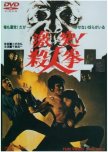
"You're disgusting, you make me sick!" Preach on sister!
The Street Fighter was violent, exploitive, and had almost no redeeming qualities. Takuma Tsurugi was the manliest man to ever man which means he got a pass for sexual assault and selling a woman into sex slavery. This was a violent film just to be violent, with little story to go with it.Takuma breaks a death row convict out at the last minute. When the convict’s brother and sister can’t pay the last installment he begins to rape the sister. The brother tries to intervene, so Takuma kills him, and sells the sister to be a sex slave. Big man. A group attempts to hire him to kidnap an heiress but he turns down their lowball number. Because Takuma knows of their plan they attempt to eliminate him which drives him to be the heiress’ protector. After forcibly kissing and groping her, he's hired on to protect her. When the convict discovers what happened to his family he joins the other bad guys for the chance to free his sister and kill Takuma. Yeah, at this point I’m rooting for anyone who would kill this b@stard.
The fight scenes weren’t well choreographed and I hated Sonny’s fighting style and acting. The editing was even worse. At one point Takuma asked his sidekick, “How did you get here?” I was expecting Ratnose to say, “Heck if I know!” It was as if they edited out anything that would have caused the story to make sense. The story jumped around and so did the people as if they had a transporter to drop them into a completely unrelated scene. The acting was bad even for a 1970’s martial arts film.
The Street Fighter failed on every account for me. Only for Sonny Chiba fans and those who enjoy the main lead behaving reprehensibly toward women. This movie put the mindless into mindless violence. At the end of the film, in big letters it declared “Return of the Street Fighter coming soon!” Thanks for the warning.
14 March 2024
Was this review helpful to you?
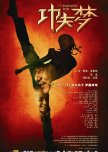
"The best fights are the ones we avoid"
How you feel about The Karate Kid remake may largely depend on how old you were when you first watched it and how old you were when you watched the original. Despite the title, in the remake they practiced kung fu, not karate, and Xiao Dre was quite a bit younger than Daniel-san had been. Other than those elements and the Chinese travelogue inserted, the basic storyline was the same.Twelve-year-old Dre has to leave everything behind when his mom is transferred to Beijing, China. While his mom looks at it as an opportunity, Dre feels left adrift. On his first day in his new home, he runs afoul of the local kung fu bullies and is beaten. He also meets sweet Mei Ying who is a classmate and violinist. After the maintenance man saves him during a vicious beating, the story is set up for Mr. Han to train Dre in kung fu.
Jaden Smith’s size made him a perfect target for bullies and it was easy to see why Dre would be afraid of Cheng and the pack he ran with. The Kick Them in the Dragon Balls School of Kung Fu mantra of “No Weakness! No Pain! No Mercy!” didn’t leave a lot of room for negotiation, especially with its abusive and sadistic master. Taraji P. Henson was gorgeous and tenacious as the over-protective mom. Jackie Chan gave a subdued performance as the mentor, Mr. Han. He only had one fight and it was with the prepubescent bullies. The kids who played Cheng and Mei Ying were adequate.
The cinematography and scenery were beautiful. There were trips to the Forbidden City, a kung fu monastery on a mountaintop, and training on the Great Wall of China. I suspect the last one is a big no-no in real life. The strange new home upped the ante on the fish out of water trope, especially when Dre didn’t speak any Mandarin. The travelogue elements while stunning, also hampered the movie as the pace was already doggedly slow. No kung fu movie needs to be 2 ½ hours long. There was also the change to the kids’ ages that I found troubling. In the original, Daniel, Ali, and Johnny, were on the verge of becoming adults. They were high schoolers where the romance seemed more natural and the fighting more acceptable. In the 2010 Karate Kid, these were 12-year-olds beating each other senseless. No wonder Mei Ying’s parents didn’t want her seeing Dre.
The original film wasn’t great but it was a touchstone for kids during that simpler time period just as this one may have been for its generation. Both Karate Kids showed that there are jerks and good people everywhere. Xiao Dre learned to show respect for his mom, his sifu, his new home, and himself. He also discovered that success required focus and dedication. The 2010 film was a fine addition to the Karate Kid family, if only they’d changed the name to correctly reflect the skill being taught. RIP Mr. Miyagi. No one can take your place in my heart.
8 March 2024
Was this review helpful to you?
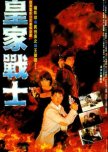
Michelle Yeoh and non-stop action!
In the Line of Duty: Royal Warriors showcased Michelle Yeoh’s rising star power. Only twenty-four at the time she had no problem carrying this film. Sanada Hiroyuki joined her making for an appealing and high kicking duo!Flying home to Hong Kong, Officer Michelle Yip and retiring Interpol agent Yamamoto become involved in a high jacking. Air Marshall Michael Wong is along for the ride as well. After defeating the two criminals, they are hailed heroes. What they don’t realize is that the now deceased “Tiger” has buddies who are seeking vengeance. From there family members are murdered, a break neck car chase takes place, later a shootout in a nightclub raises the body count, and finally an explosive battle determines who will live and who will die.
Royal Warriors was a quintessentially 1980’s cop film. It was ultra-violent, there were numerous explosions, it had a destructive high speed car chase, and a shootout in a nightclub with flying glass and bodies everywhere. You did not want to be the loved one of a cop in this era because the odds of you making it out alive were zero to none. And the nostalgia factor also shown through for me. There was a poster for my favorite movie, LadyHawke, in the background. Items you don’t see anymore like audio cassettes, boom boxes, video tapes, phone booths, and cell phones that resembled WWII walkie-talkies made their appearances.
The complex fights were no problem for Michelle Yeoh as she was athletic, fast, and agile making the moves look natural. She was in great form in this film. Sanada Hiroyuki was also able to deliver fists and kicks believably. Mang Hoi’s choreography made for thrilling fights as the two officers battled the different bad guys in deadly confrontations. No two fights were alike and the stars of this film were exciting to watch. One fight even included a chainsaw and another, a coffin! There was also plenty of gunplay for those who prefer their violence to be packed with not just punches but high-speed lead.
Lam Wai and Michael Chan conveyed their villains in quiet deadly fashion. Pai Ying preferred to chew the scenery with his maniacal “Bandana”. As I mentioned, Michelle and Hiroyuki played their roles quite well. Michael Wong’s Michael seemed out of place. Everyone else was in a brutally violent film and he acted like he was in a romantic comedy. The character seemed badly out of place. I suppose the writers felt the need for some humor in the dark and deadly film, but Michael came across as annoying instead of funny. The attempt at a romance also failed.
Though the technology and ultra-violent deaths for civilians date it, the movie largely holds up today. The action was nearly constant and well choreographed making for an entertaining movie. The writers did Michelle a solid and didn’t make her have to be rescued or have the male lead take down the bad guy in the end as so many films have done with strong female leads. There were no histrionics, just a powerful woman doing her job and taking out the trash. Michelle Yeoh shone brightly and would develop her screen persona even more after this film. If you like martial arts films, 1980’s crime films, or the girls with guns genre, this is one try.
4 March 2024
Was this review helpful to you?

"Dying is easy, surviving is hard" Getting through this movie was harder
Fist of Legend (2019) aka Legend of Chenzhen aka Fist of Legend/II was a prequel of sorts to Jet Li’s Fist of Legend from 1994. This was a cheaply and poorly made movie that would have looked out of place in 1994.Chen Zhen is in Japan as a student to learn about the enemy so that he can go home and help protect China. He falls for Mitsuko whose uncle is the virtuous president of the Black Dragon Society. Also interested in Mitsuko is the vile Black Dragon VP Chiyo Shinobu. Chiyo is in cahoots with evil military Col. Fujita. They are looking to bring down the Black Mask who has made fools of their samurai on the streets and they think it is Chen Zhen. Chen Zhen has been ordered to keep his head low which he accomplishes until Chiyo goes too far.
This movie lacked any spirit to it and was filled with problems. Chen Zhen was given zero personality. Huang Wei Ting as Mitsuko tried to double up her energy level to replace his. One of the problems with non-Japanese playing Japanese is that they don’t know how to walk in kimonos and as someone who has watched my share of Japanese movies, it comes across as awkward. Xu Shao Hang was a handsome if heartless Chiyo. There were “Americans” who looked anything but. The military uniforms appeared to be more Russian or German than US. You know a movie is desperate when it contains not one, but two sexual assaults and a repeat of one of those. The dubbing was awful, the green screens obvious, and the music played loudly over the dialogue on several occasions.
It’s a kung fu film, so maybe the fights were good. Unfortunately, most of the fights were awful and relied on quite a bit of wire work. The trained samurai were nice enough to come at Chen Zhen one at a time and not know how to swing their swords while samurai in the background just waved theirs around in the air. The fight choreography was abysmal for a 2019 production. It’s too bad because Tiger Xu moved well enough to handle better fight scenes. And story-wise, why would Chen Zhen wait until what appeared to be midday to rescue his girl after he knew she’d been kidnapped that night? Good job there hero.
Fist of Legend was populated with pretty people but lacked in everything that would make a film interesting. Even at 77 minutes it felt overly long. Plus, it might cause eye strain for all the times you'll feel like rolling your eyes at the ridiculous scenarios and terrible fight scenes. This film is just watchable, especially if you aren’t familiar with martial arts movies or have a need to watch all the movies about the fictional character Chen Zhen. There are better movies about the Black Masked warrior out there.
2 March 2024
Was this review helpful to you?
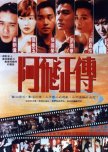
"You'll see me in your dreams tonight"
Days of Being Wild showed what lengths broken people would go to in order to find the object of their desire. Time, whether it hastened by too quickly or dragged like a cement block, tethered the characters to their obsessions. Everyone had a myopic gaze of life and much of it revolved around a self-obsessed rebel.Yuddy had a habit of seducing women and then breaking their hearts. Raised by a sex worker, he desperately wanted to know who his biological mother was. Rebecca had told him his mother was a Filipino noblewoman who had paid her to raise him. Mom really put a lot of thought into that one, didn’t she? Yuddy seduced Su Li Zhen who ran a snack stand and box office by having her look at his watch for a minute. One minute before 3:00 was to be burned in their minds on that date. Their relationship flared and flamed out when Li Zhen realized he would never marry her. Before he could change the sheets on his bed, he’d seduced exotic dancer Mimi.
Women were obsessed with Yuddy---Li Zhen, Mimi, and even his adoptive mother Rebecca. And I never could figure out why. He thought only about himself and constantly told them what they could and couldn’t say. He must have been one hell of a lover to make them lose their dignity and hearts over him. Young love is often messy and impulsive with heavy doses of heartache and drama but it was hard to understand why these women found him so irresistible. How desperate for love, sex, and/or companionship they must have been. Loneliness can be a harsh mistress.
Yuddy often compared himself to a bird with no legs who had to keep flying when in reality the bird had been dead all along. The story lost steam when he left Hong Kong to find his mother in the Philippines. Without the women he seemed even more like a loser with no job, no family, and on a headlong journey to disaster.
Much of the background noise was the chiming and ticking of clocks. “I used to think a minute could pass so quickly, but actually, it can take forever,” Li Zhen told the young policeman named Tide. Later Yuddy would tell Tide, “Life really isn’t that long.” For the heartbroken, the nights took forever to pass. For a young man who made a reckless decision, it passed all too quickly and that minute would be seared in his memory.
The cast was stellar. Leslie Cheung gave Yuddy a primal movement that even the corny pickup line of, “You’ll see me in your dreams tonight” made women thirsty for him. Maggie was gorgeous but other than standing or walking around looking anguished with her hair in her eyes had little to do. Carina Lau as Mimi chewed up the scenery as the brash cabaret dancer in love with Yuddy. Andy Lau, like Maggie, was underused until the final chapter. The dark, subdued lighting and greens and golds were reminiscent of In the Mood for Love, as well as the final character revealed.
Perhaps because the actors seemed too old to be so foolhardy, I found the characters difficult to connect with and care about. The despondent mood was as dreary as the rain soaked streets the characters wandered through. Days of Being Wild was beautifully shot, lit, and composed and while mesmerizing to look at, it left me feeling empty afterward.
28 February 2024
Was this review helpful to you?

 54
54 191
191 11
11






















